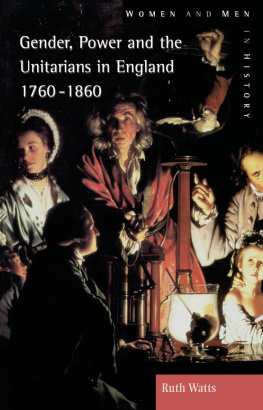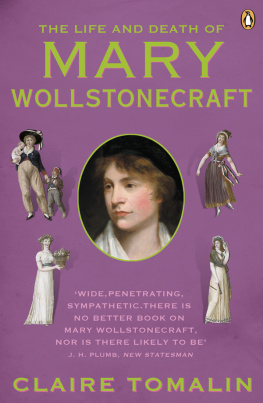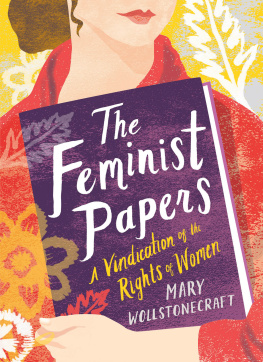Transcriber's Note:
Obvious typographic errors have been corrected.
MARY WOLLSTONECRAFT
AND THE BEGINNINGS OF
FEMALE EMANCIPATION
IN FRANCE AND ENGLAND
title page
MARY WOLLSTONECRAFT
AND THE BEGINNINGS OF
FEMALE EMANCIPATION
IN FRANCE AND ENGLAND
ACADEMISCH PROEFSCHRIFT TER VER
KRIJGING VAN DEN GRAAD VAN DOCTOR
IN DE LETTEREN EN WIJSBEGEERTE AAN
DE UNIVERSITEIT VAN AMSTERDAM OP
GEZAG VAN DEN RECTOR-MAGNIFICUS
Dr P. ZEEMAN, HOOGLEERAAR IN DE
FACULTEIT DER WIS- EN NATUURKUNDE,
IN HET OPENBAAR TE VERDEDIGEN IN
DE AULA DER UNIVERSITEIT OP VRIJDAG
17 NOV. 1922 DES NAMIDDAGS TE 4 UUR
DOOR
Jacob Bouten ,
GEBOREN TE DORDRECHT
H. J. PARIS
V H FIRMA A. H. KRUYT
AMSTERDAM
TO
MY WIFE
PREFACE.
There is something particularly fascinating about the study of the literature and philosophy of the eighteenth century, with its gradual evolution of lofty social ideals which the Revolution failed to realise. When the altered circumstances brought promotion within my reach, it completely brought me under its sway, and ultimately came to determine my choice of a subject for an inaugural dissertation. It was while engaged upon tracing the influence of Rousseau's hopebringing theories on his English disciple William Godwin, that the less boldly assertive, but all the more humanly attractive personality of the latter's first wife, Mary Wollstonecraft, attracted my attention. My admiration of her husband's intellect paled before my sympathy for her more modest, but at the same time more emotional character. Where the indebtedness of Godwin to Rousseau and the Encyclopedians has been manifested so clearly in different works, the absence of any direct attempt to prove and determine the extent of the relations between Mary Wollstonecraft and the early French philosophers struck me as an omission for which I found it difficult to account, and made me turn to a subject to which I am fully aware that a book of the size of the present little volume does but scant justice.
I wish to avail myself of this opportunity to thankfully acknowledge the valuable help and friendly encouragement received from Professor Dr. A. E. H. Swaen, of the University of Amsterdam, whose unceasing kindness and ever-ready interest in the preparation of this treatise I shall never forget.
Mr. K. R. Gallas, Lecturer on French Literature in the same University, has likewise a claim to my heartfelt gratitude for giving me the benefit of his extensive knowledge in making various suggestions with regard to the chapters dealing with the literature of France.
My best thanks are also due to Mr. M. G. van Neck and Dr. P. Fijn van Draat for guiding my reading for the B.-examination, and particularly to my first teacher of English, Mr. L. P. H. Eijkman, for giving me that interest in England and her language and literature which has determined my subsequent career.
Amsterdam, November 1922.
CONTENTS
| CHAP. | PAGE |
| I. | The Main Theories regarding the Position of Women |
| II. | The Beginnings of a Feminist Movement in France |
| III. | The Position of French Women in Eighteenth Century Society |
| IV. | Feminist and Anti-Feminist Tendencies among the English Augustans |
| V. | Qualified Feminism: the Bluestockings |
| VI. | Radical Feminism: Mary Wollstonecraft |
| Bibliography |
INTRODUCTORY CHAPTER. The Main Theories regarding the Position of Women.
The history of the Emancipation of Women is the long and varied record of their slow and gradual liberation from that utter subjection to Man in which various circumstances beyond their controlamong which the physical superiority of the latter, a form of male supremacy which has seldom been called into question, was probably the most prominenthad combined to place them. It relates how in the course of centurieseither with the support of a certain portion of the opposite sex or relying upon their own resourcesthey strove to cast off the shackles which bound and degraded them, and to acquire that degree of physical, intellectual and moral freedom to which they felt themselves entitled. That the movement towards complete enfranchisement met with a varied reception and was hampered and retarded by men and often by women themselves was due chiefly to the fact that in the question of female possibilities there was much diversity of opinions at different times and among different nations. The worst enemies to evolution of this kind were those women who, holding the Empire of Love and Gallantry to be their exclusive domain, in which their sway was not likely to be ever disputed, turned deliberately against those of their own sex who in trying to wrench from the hands of men the sceptre of social power, were willing to forego the privileges of sex. That women were thus divided among themselves from the first, was the natural outcome of those differences in personal attractions and in personal intelligence which have always constituted the great danger of too sweeping conclusions with regard to the inclinations and capabilities of the female sex. Individual members of the same sex may yet be radically different, and he who would prescribe for all will always find himself confronted by the bewildering problem of the disparity of individuals.
The champions of the Cause of Woman have had to overcome a great deal of stubborn opposition, nor can it be said that even at the present moment the emancipation of women is complete. Even now that the ideal of perfect equality in everything seems almost within reach, and the domestic woman has largely given way to the social worker and political agitator, it may be a matter of speculation whether the full realisation of the long wished-for end, throwing open to women all those occupations from which centuries of injustice rigorously excluded them, would mean a blessing to society and to women in particular, or a mixture of gain and loss. Those who regard women from the all-human standpoint, holding the functions of sex to be only a passing incident in the great scheme of life, will be inclined to take the former view; those, on the other hand, who believe that a woman's life derives its colour from considerations of sex which refuse to be ignored, may well wonder where a rigorous application of perfect equality will land us in the end. In one respect however, there has been great and undeniable progress. The modern tendency to overlook sexual differences ensures to individual women the necessary freedom to judge for themselves whether a life of domestic or one of social duties will be more compatible with their personal inclinations; and no woman whose hopes of domestic bliss are rudely blunted, needas was the case in former timesdespair of succeeding in life; any talents she may happen to possess, will find full scope. If we contrast with this the truly pitiable condition of unmarried women in earlier ages, who were too often treated contemptuously for failing to perform what was considered the only duty of womanhoodthe propagation of the specieswe cannot but feel grateful to the champions of emancipation, whose restless ardour and unceasing devotion has entailed such glorious results.
The feminist programme includes a number of points, on some of which something will have to be said. There is, in the first place, that physical enfranchisement which makes the woman cease to be the willess, and therefore irresponsible and soulless, slave to the caprices of a brutal master. There is, in the second place, the intellectual emancipation of women, admitting the female sex to the participation of Reason and granting them that education of the mind which is to place them on a par with the other half of humanity; and there is that moral emancipation which recognises woman as a being endowed with a soul, equal to that of man, with consequent moral duties and responsibilities, partly dictated by considerations of sex. As a direct consequence of these, there is finally, social emancipation, constituting principles of perfect equality between the sexes, also in matters of social and political interest. They are all of them largely dependent on the growth of civilisation. It has even been said that the degree of civilisation in a nation is determined by the position of its women in the life of the community.







